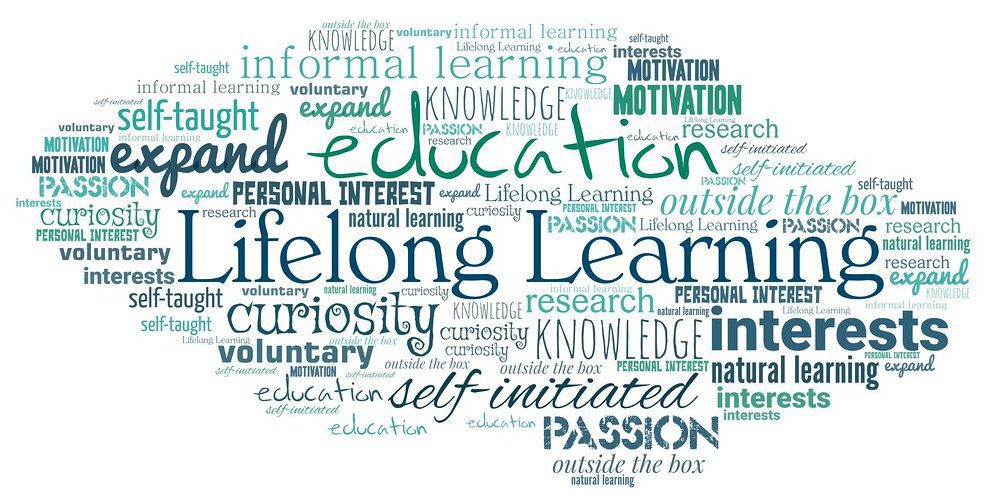In today’s world, learning new things is more important than ever. With so much change happening constantly, it’s essential to be able to adapt and learn new skills quickly. That’s where continuing education comes in. It allows you to learn new things in a variety of areas, from your job to your hobbies to your family life. And the best part? You can do it all online, through courses, webinars and live trainings. So why not start today? Check out some of the great platforms out there that offer continuing education, like Udemy.com and coursera.com, and get started on expanding your knowledge.
What is continuing education and why is it important?
Continuing education is defined as “the process of keeping up with the latest development in one’s field through attendance at seminars, courses, or conferences.” In other words, it’s a way to make sure you’re always learning and keeping your skills up-to-date.
There are many reasons why continuing education is important, regardless of your age. First, it helps you stay competitive in the workforce. If you’re constantly learning new things and improving your skills, you’ll be more attractive to employers than someone who isn’t keeping up with the latest trends. Second, continuing education can help you earn more money. Often, people who have updated skills and knowledge are able to command higher salaries than those who don’t.
Finally, continuing education can simply make you a more well-rounded and interesting person. Life is all about learning, and there’s no reason to stop once you finish formal schooling. So if you’re looking for a way to improve your career prospects, earn more money, or just keep your mind sharp, consider taking some continuing education courses. You may be surprised at how much you enjoy it.
The different types of learning
Learning can take many different forms, and there is no one best way to learn. Some people prefer a more traditional approach, sitting in a classroom and listening to lectures. Others may prefer a more hands-on approach, learning through doing and experimentation. There is no wrong way to learn, and the best approach depends on the individual learner’s needs and preferences.
One of the most common types of learning is rote learning, or memorization through repetition. This is often how we learn things like our multiplication tables or the days of the week. Rote learning can be effective for simple information that needs to be memorized, but it is not always the best approach for more complex material.
Another type of learning is known as concept mapping. This involves creating a visual representation of ideas and concepts in order to better understand their relationships. Concept maps can be helpful for understanding complicated material, and they can also be used as a study tool when preparing for exams.
There are many other types of learning, including problem-based learning, inquiry-based learning, and cooperative learning. The best way to learn is to experiment with different approaches and find what works best for you.
Learning experiences and results require a method that works best with your individual learning style according to the senses you prefer.
Visual learners prefer to take in information through seeing. They often benefits from visual aids such as charts, graphs, and diagrams. When studying, they may need to sit in the front of the class so they can see the board clearly. Additionally, they may want to highlight important information in their texts.
Auditory learners process information best by hearing it. Listening to lectures and participating in class discussions can be helpful for this type of learner. They may also benefit from reading texts aloud or using mnemonic devices such as rhymes or songs to remember information.
Tactile/kinesthetic learners like to learn through movement and touch. This type of learner often benefits from objects or manipulating materials while they learn. They may need to take breaks often to move around and may prefer standing over sitting when possible. Additionally, they may learn best by taking notes by hand rather than typing them on a computer.
There are many different ways to learn, and everyone has their own preferences. Experiment with different methods and find what works best for you. You may be surprised at how much easier learning can be when you find a method that suits your needs.
The benefits of learning new skills
Learning new skills can seem like a daunting task, but the benefits are well worth the effort. Not only can new skills help you to be more successful in your current career, but they can also open up new opportunities for advancement. In addition, learning new skills can help to boost your confidence and give you a sense of satisfaction. And of course, it is always satisfying to be able to say “I know how to do that!” Whether you learn a new skill through formal education or on-the-job training, the end result is the same: you will be a more knowledgeable and capable individual. So don’t be afraid to stretch yourself and learn something new. The rewards will be well worth the effort.
But learning new things is not only a great way to speed up your career. There are tons of topics, fields of study and skills that are interesting and can make you a more well-rounded person. It can also be a great way to meet new people and make friends since people who share your interests are often drawn to each other. And of course, learning can be simply enjoyed for its own sake. There is no better feeling than the satisfaction of acquiring a new skill or understanding a difficult concept. So whatever your motivation for learning, make sure to enjoy the process and the rewards that come with it.
How to get started immediately
If you’re like most people, you probably have a long list of skills you’d like to learn. Maybe you want to learn a new language, pick up a musical instrument, or master a new software program. Whatever the skill may be, putting off learning it can have serious consequences. Studies have shown that procrastination is the number one dream killer. Not only does it prevent you from achieving your goals, but it can also lead to feelings of anxiety and depression.
So how can you avoid the trap of procrastination? The key is to take action immediately. When you have the urge to procrastinate, force yourself to start working on the task at hand. Set a timer for five minutes and see how much progress you can make. Once the timer goes off, you can decide whether or not to continue working. But chances are, once you get started, you’ll find it easier to keep going. Remember, the sooner you start learning a new skill, the sooner you’ll be able to achieve your goals.
To get started make a priority list of the skills you want to learn and then research the best ways to learn each one. Once you have a plan, set a goal for yourself and make a commitment to stick with it. And finally, take action immediately. Don’t skip this part and enroll immediately in the course, webinar or class you have been meaning to. Learning new skills is a great way to improve your career, confidence and overall satisfaction in life. So what are you waiting for? Get started today.
The best platforms to learn new things online
With the ubiquity of the internet, there are now more opportunities than ever to learn new things online. However, with so many options available, it can be difficult to know where to start. In general, the best platforms for learning new things online are those that offer high-quality content, flexibility, and support.
Udemy – Udemy is a popular platform that offers thousands of courses on a wide range of topics. The courses are taught by experts and often include video lectures, quizzes, and assignments. Udemy offers great discounts on their courses from time to time. If you’re lucky, you can get up to 95% off the original price. For example, I recently enrolled in a course on Udemy that was originally $200 but only cost me $11 because of the discount.
Coursera and edX – Both offer courses from top universities such as Harvard and Stanford. In addition, many colleges and universities now offer online courses that can be taken for credit. As a result, there are a wealth of options available for those who want to learn new things online.
Skillshare – Skillshare is a platform that offers thousands of online courses taught by industry experts. The courses are typically shorter than those offered on other platforms and often focus on specific skills or topics.
Mindvalley – Mindvalley is a platform that offers courses on personal development, entrepreneurship, and health and fitness.
LinkedIn Learning – LinkedIn Learning is a platform that offers courses on business, technology, and creative topics. Focused on your career development, LinkedIn Learning is a great resource for those who want to learn new things online.
So there you have it, a list of the best platforms to learn new things online. No matter what you’re interested in learning, there’s sure to be a platform that’s right for you. So what are you waiting for? Get started today and learn something new.
How to make the most of your newly learned skills
You’ve just learned a new skill. Congratulations! Now it’s time to put that skill to use. Here are a few tips to help you get the most out of your newly acquired knowledge.
First, take some time to practice. Just like anything else, the more you use your new skill, the better you’ll become at it. So set aside some time each day to hone your craft. You can start with small projects and work your way up to bigger ones.
Second, don’t be afraid to experiment. Trying new things is how we learn and grow. So go ahead and experiment with your new skill. Try different techniques and see what works best for you.
Third, share your skills with others. When you teach someone else what you’ve learned, it not only helps them, but it also helps you solidify your own knowledge. So don’t be shy about sharing your new skill with others. You never know who you might inspire.
The top requested skills to learn in 2022
It’s never too late to learn a new skill, and with the ever-changing landscape of the workforce, it’s becoming more and more essential to stay ahead of the curve. Here are the top requested skills to learn in 2022, according to a recent survey of hiring managers:
1. data analysis: as businesses increasingly rely on data to guide decision-making, those with the ability to analyze and interpret data will be in high demand.
2. natural language processing: with the continued growth of voice-activated technologies like Alexa and Siri, those who can understand and respond to human speech will be in high demand.
3. machine learning: as artificial intelligence becomes more prevalent, those with the ability to train machines to learn will be in high demand.
4. digital marketing: as businesses shift their focus online, those with the ability to reach and engage customers through digital channels will be in high demand.
5. web development: as businesses continue to build their presence online, those with the ability to create and maintain websites will be in high demand.
Don’t forget about soft skills
There’s no doubt that hard skills are important. After all, they’re the tangible skills that you can list on your resume and reference during an interview. But in today’s ever-changing marketplace, employers are increasingly placing a premium on soft skills. These are the interpersonal skills that allow you to interact effectively with others and get the most out of your team. Here are some of the top soft skills that employers are looking for in today’s candidates:
• Communication: The ability to communicate clearly, both verbally and in writing, is essential in any role. Whether you’re communicating with a client or colleague, it’s important that you’re able to express yourself clearly and effectively.
• teamwork: In most roles, you’ll be expected to work with others towards a common goal. As such, it’s important that you’re able to collaborate effectively and contribute to a positive team dynamic.
• flexibility/ adaptability: With the pace of change accelerating, it’s more important than ever that employees are able to adapt to new situations and embrace change. Those who are flexible and open to new ideas will be best positioned for success in today’s ever-changing workplace.
• problem-solving: The ability to identify and solve problems is a valuable skill in any role. Whether you’re troubleshooting a technical issue or resolving a conflict, those who are able to find creative solutions will be in high demand.
• critical thinking: In today’s information-rich world, it’s more important than ever that employees are able to think critically and make sound decisions. Those who are able to analyze data and make informed decisions will be in high demand.
• creativity: As the workplace evolves, so too does the need for creativity. Whether it’s coming up with new ideas or finding innovative solutions to problems, those who are able to think outside the box will be in high demand.
As you can see, there are a variety of skills that employers are looking for in today’s candidates. While some of these skills may come more naturally to you than others, the good news is that they can all be learned. So if you’re looking to make yourself more marketable in today’s workforce, consider investing in some continuing education. Whether it’s taking a course on data analysis or learning how to code, there are plenty of options available to help you learn the skills you need to succeed.
Takeaways
It’s never too late to learn new skills and continue educating yourself. The benefits of continuing education are many, and they include increased job security, the ability to keep up with changing trends, and greater career opportunities. So if you’re looking to make yourself more marketable in today’s workforce, consider investing in some continuing education. Whether it’s taking a course on data analysis or learning how to code, there are plenty of options available to help you learn the skills you need to succeed.
I hope you found this article helpful. If you have any questions or comments, please feel free to leave them below. I wish you the best of luck in your career journey!






















